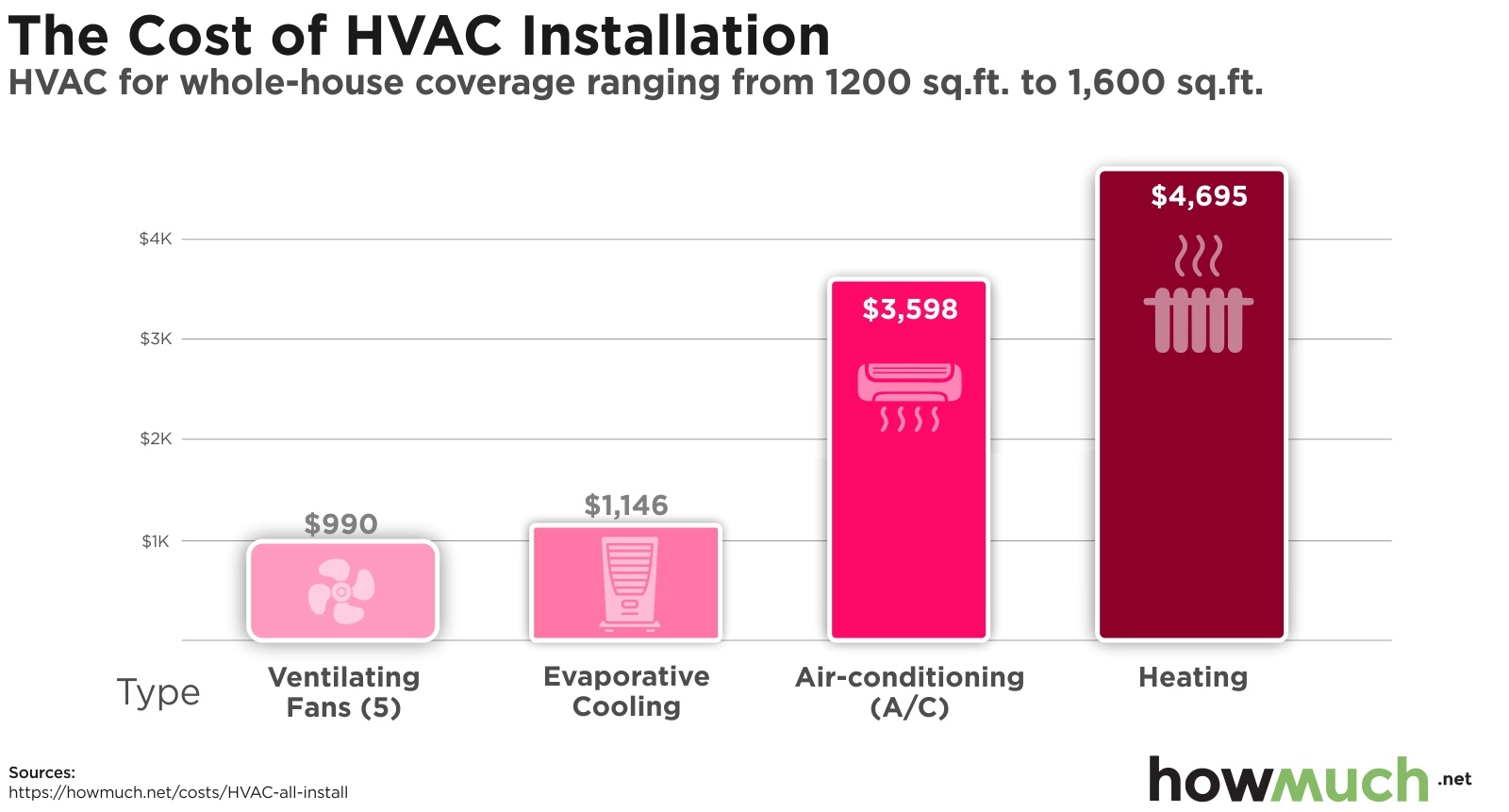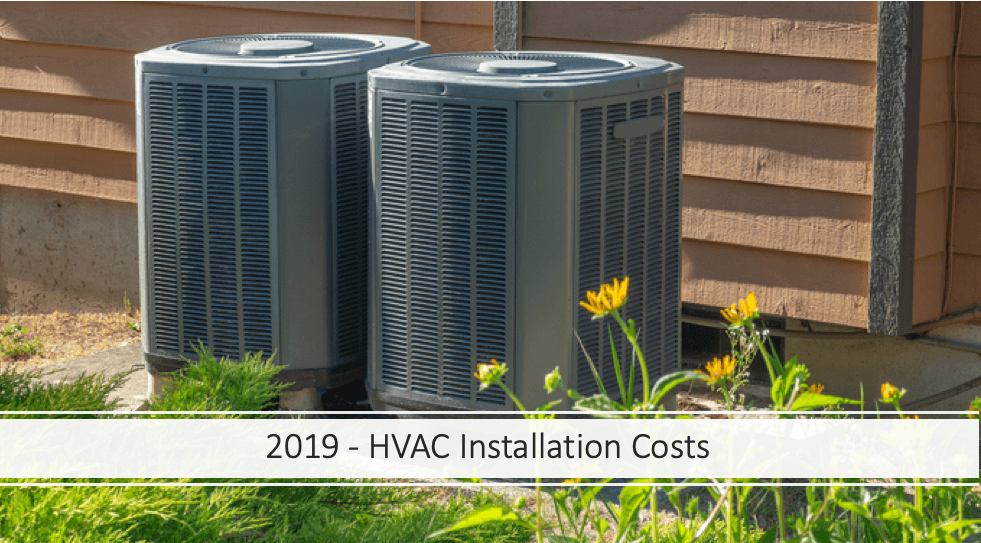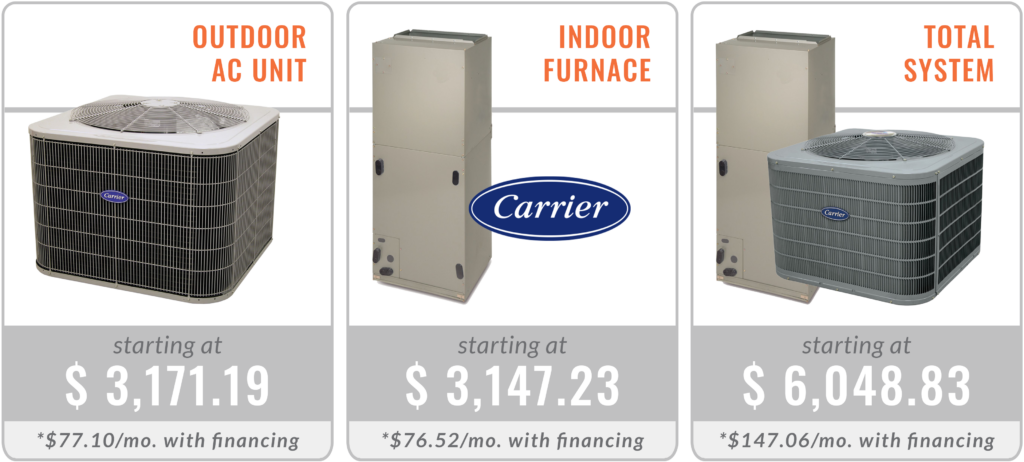How Much To Install Hvac System In House

Understanding the cost of installing a new HVAC (Heating, Ventilation, and Air Conditioning) system in your house is a crucial step for homeowners. This isn't a small expense, and it's wise to be prepared. This guide breaks down the factors influencing HVAC installation costs, providing you with a clear picture of what to expect and how to make informed decisions.
Factors Influencing HVAC Installation Costs
Several elements contribute to the overall price of a new HVAC system. Let's explore each in detail:
1. System Type and Size
The type of HVAC system significantly affects the cost. You have several options:
- Central Air Conditioning and Furnace: This is the most common setup, involving a separate air conditioner for cooling and a furnace for heating. Think of the furnace as a powerful oven that heats air, which is then distributed throughout your home. This is the *most cost-effective* option.
- Heat Pump: A heat pump can both heat and cool your home. In the summer, it works like an air conditioner, extracting heat from inside and releasing it outside. In the winter, it reverses the process, extracting heat from the outside air (even when it's cold!) and bringing it inside. Consider refrigerant as the "blood" of your AC system, carrying heat from inside to outside and vice versa. They're more expensive upfront but can offer long-term energy savings.
- Ductless Mini-Split: Ideal for homes without existing ductwork or for targeting specific areas, these systems consist of an outdoor unit connected to one or more indoor units. Installation is often simpler, but the cost per zone can be higher.
- Geothermal: These systems use the earth's constant temperature to heat and cool your home, offering excellent energy efficiency but requiring a significant upfront investment for underground installation. The technology is expensive, but in the long run, you are saving money and helping the environment.
The size of the system, measured in BTUs (British Thermal Units) for cooling and heating capacity, also impacts the price. A larger home requires a more powerful system, increasing the cost. Choosing the *right size* is critical. An oversized system will cycle on and off frequently, wasting energy and reducing its lifespan. An undersized system won't adequately heat or cool your home.
2. Brand and Efficiency
Different HVAC brands offer varying levels of quality, features, and warranties. Well-known brands like Carrier, Trane, and Lennox typically command a higher price but often offer better reliability and performance. However, less expensive brands can still be a viable option if you are working with a reliable installer. The Seasonal Energy Efficiency Ratio (SEER) for cooling and the Annual Fuel Utilization Efficiency (AFUE) for heating indicate the system's energy efficiency. Higher SEER and AFUE ratings mean greater energy savings, but they also translate to a higher initial cost.
3. Ductwork
Existing ductwork can significantly reduce installation costs if it's in good condition and properly sized for the new system. However, if the ductwork is damaged, leaky, or inadequate, it will need to be repaired, replaced, or modified, adding to the expense. Ductwork can be described as the "arteries" of your HVAC system, so it needs to be in great condition for everything to work well.
4. Installation Complexity
The complexity of the installation process also affects the price. Factors like:
- Accessibility: Is it easy for installers to access the existing system and ductwork? Difficult access can increase labor costs.
- Modifications: Will modifications to the home be necessary, such as creating space for new ductwork or upgrading the electrical panel?
- Permits and Inspections: Local building codes often require permits and inspections for HVAC installations, adding to the overall cost.
Installations requiring extensive modifications or dealing with challenging access points will naturally be more expensive.
5. Labor Costs
Labor costs vary depending on your location, the contractor's experience, and the complexity of the job. It's always a good idea to get multiple quotes from different contractors to compare pricing. Ensure the quotes include all aspects of the installation, including labor, materials, permits, and disposal of the old system.
6. Location
Geographical location significantly impacts HVAC installation costs. Areas with a higher cost of living typically have higher labor rates and material prices. Also, climate plays a role. In regions with extreme temperatures, the demand for HVAC systems is higher, potentially driving up prices. Also, different regions have specific code regulations that need to be followed.
Average HVAC Installation Costs: A Range
Providing an exact cost for HVAC installation is difficult because of the factors mentioned above. However, here's a general cost range:
- Central Air Conditioner and Furnace: $4,000 - $12,000+
- Heat Pump: $4,500 - $15,000+
- Ductless Mini-Split (per zone): $3,000 - $8,000+
- Geothermal: $20,000 - $45,000+
These are just estimates, and your actual cost may vary. Always get multiple quotes from licensed and insured HVAC contractors.
Hidden Costs to Consider
Beyond the initial installation cost, be aware of potential hidden expenses:
- Electrical Upgrades: A new HVAC system may require upgrading your electrical panel to handle the increased load. This can add several hundred to several thousand dollars to the project.
- Duct Cleaning: If you're replacing an old system, consider cleaning your ductwork to remove dust, allergens, and debris. This can improve air quality and system efficiency.
- Insulation: Proper insulation helps maintain a consistent temperature in your home, reducing the load on your HVAC system and lowering energy bills. Consider adding or upgrading insulation during the HVAC installation.
- Smart Thermostat: Upgrading to a smart thermostat allows you to control your system remotely, optimize energy usage, and potentially save money on utility bills.
Tips for Saving Money on HVAC Installation
While HVAC installation is a significant investment, there are ways to potentially save money:
- Get Multiple Quotes: Obtain at least three quotes from different contractors. Compare not only the price but also the scope of work, the equipment being offered, and the contractor's experience and reputation.
- Consider Off-Season Installation: HVAC contractors are often less busy during the spring and fall, potentially leading to lower prices.
- Take Advantage of Rebates and Incentives: Check for federal, state, and local rebates and incentives for energy-efficient HVAC systems. Many utility companies offer rebates for installing high-SEER air conditioners or high-AFUE furnaces.
- Negotiate: Don't be afraid to negotiate the price with the contractor. Ask if they offer any discounts or financing options.
- Proper Maintenance: Once the system is installed, ensure you schedule regular maintenance to keep it running efficiently and prevent costly repairs. Change filters regularly, clean the outdoor unit, and have a professional inspect the system annually.
Choosing the Right HVAC Contractor
Selecting a reputable and experienced HVAC contractor is crucial for a successful installation. Here are some factors to consider:
- Licensing and Insurance: Ensure the contractor is properly licensed and insured. This protects you from liability if something goes wrong during the installation.
- Experience and Reputation: Choose a contractor with a proven track record and positive reviews. Ask for references and check online reviews.
- NATE Certification: NATE (North American Technician Excellence) certification indicates that the technician has undergone rigorous training and testing.
- Written Estimate: Get a detailed written estimate that includes all aspects of the installation, including equipment, labor, permits, and disposal fees.
- Warranty: Ensure the contractor offers a warranty on their workmanship in addition to the manufacturer's warranty on the equipment.
Don't base your decision solely on price. A lower price may indicate lower-quality equipment or inexperienced installers. Choose a contractor who offers a combination of fair pricing, quality equipment, and excellent service.
HVAC Installation: A Long-Term Investment
Installing a new HVAC system is a significant investment in your home's comfort and value. By understanding the factors influencing the cost, getting multiple quotes, and choosing a reputable contractor, you can make an informed decision that provides years of reliable and efficient heating and cooling.
Remember, a well-installed and maintained HVAC system can improve your home's air quality, reduce energy bills, and enhance your overall comfort. Take the time to research your options and choose the right system for your needs and budget.










